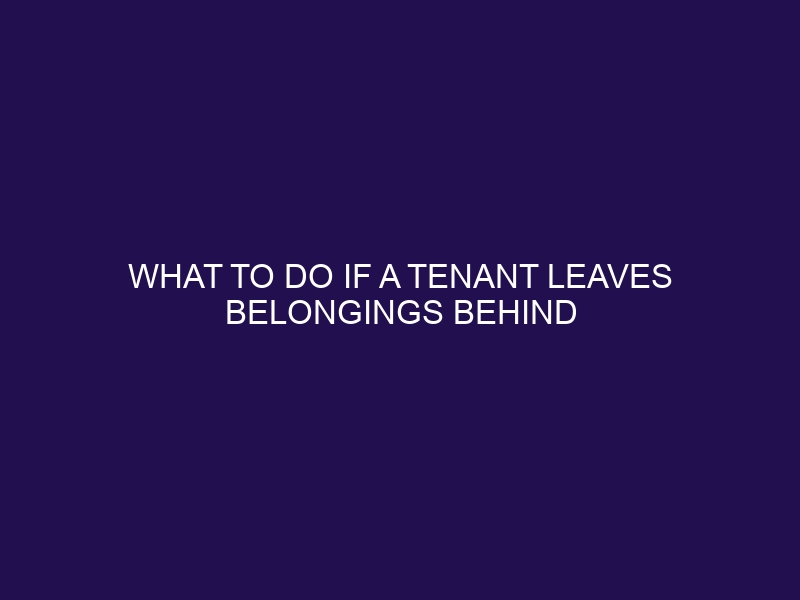What to Do If a Tenant Leaves Belongings Behind
When a tenant leaves behind their belongings after vacating a rental property, it presents a unique situation for landlords to address. Understanding how to handle this scenario is essential to ensure a smooth transition and adhere to legal obligations. This article will provide guidance on what to do if a tenant leaves belongings behind, outlining the necessary steps and considerations.
To begin, it is crucial to comprehend the reasons why tenants may leave their belongings behind. This could be due to moving in a rush, financial constraints, or simply forgetting to remove certain items. By understanding the underlying reasons, landlords can approach the situation with empathy and clarity.
Landlords also have legal obligations when dealing with abandoned belongings. Familiarizing oneself with local laws and regulations is important to ensure compliance and protect both parties involved. Each jurisdiction may have specific requirements for the handling and disposal of abandoned items.
The initial steps taken in such situations play a crucial role in resolving the matter efficiently. This includes documenting the condition of the property after the tenant’s departure and reviewing the lease agreement for any pertinent clauses regarding abandoned belongings. These initial steps lay the foundation for the subsequent actions.
Contacting the tenant is a necessary step to inform them about their belongings and provide an opportunity for retrieval. This typically involves sending a formal notice outlining the situation and providing a specific deadline for the tenant to collect their items. Clear communication ensures that all parties are on the same page and can help avoid misunderstandings or further complications.
Once the deadline has passed, landlords must handle the abandoned belongings appropriately. This involves considering storage options and creating an inventory of the items left behind. If the tenant fails to retrieve their belongings within the specified timeframe, landlords may need to explore disposal options in accordance with local laws and regulations.
It is important to note that there are legal considerations to keep in mind when facing this situation. Consulting with an attorney can provide valuable guidance and ensure that landlords navigate the process within the bounds of the law. Understanding state-specific regulations and requirements is crucial to protect both the landlord’s and the tenant’s rights.
By following the appropriate steps and considering the legal aspects, landlords can effectively handle situations where a tenant leaves belongings behind. Resolving the matter in a fair and systematic manner helps maintain positive landlord-tenant relationships and ensures a smooth transition for all parties involved.
Understanding the Situation
When a tenant leaves belongings behind, it can be a challenging situation for both landlords and tenants. In this section, we will uncover the reasons why tenants may leave their belongings, as well as the legal obligations landlords have in such cases. Get ready for some eye-opening insights into the complexities that arise when dealing with abandoned items and the important responsibilities that fall upon landlords. It’s time to dive into the nitty-gritty of understanding this situation and all that it entails.
Reasons for Tenant Leaving Belongings Behind
There can be various reasons why a tenant might leave their belongings behind when moving out of a rental property. Some common reasons for tenant leaving belongings behind include unexpected relocation, financial difficulties, or abandonment of the property. It’s important for landlords to understand the reasons behind this situation in order to handle it appropriately. By taking necessary legal steps, documenting the condition of the property, and contacting the tenant to provide a deadline for retrieval, landlords can address the issue effectively. It is advisable to consult with an attorney and familiarize oneself with state laws and regulations to ensure compliance. Clear communication and understanding can lead to a smoother resolution in cases where tenants leave their belongings behind for reasons related to their move.
Legal Obligations of the Landlord
The legal obligations of the landlord when dealing with tenant belongings left behind are important to follow. This includes documenting the condition of the property, reviewing the lease agreement, and contacting the tenant. Landlords should also send a notice to the tenant and provide a deadline for retrieval. If the tenant does not claim their belongings, the landlord must carefully consider disposal options in accordance with state laws and regulations. It can be helpful for landlords to consult with an attorney during this process. Understanding their legal responsibilities and taking appropriate steps to handle abandoned tenant property is crucial.
Initial Steps to Take
When a tenant leaves belongings behind, it can be challenging to know where to begin. In this section, we’ll uncover the initial steps you should take to handle this situation smoothly. From documenting the condition of the property to reviewing the lease agreement, we’ll guide you on the necessary actions to ensure a fair and efficient resolution. So, let’s dive in and explore the crucial first measures you need to undertake when faced with abandoned tenant possessions.
Documenting the Condition of the Property
To document the condition of the property, landlords can create a comprehensive checklist or conduct a thorough inspection. This can include taking photographs and videos of each room, noting any existing damages, and recording the condition of appliances, fixtures, and furnishings. It is crucial to be objective and detailed in documenting any issues or discrepancies. This documentation serves as evidence in case of any disputes or claims made by either party. By carefully documenting the condition of the property, landlords can ensure transparency, protect their interests, and maintain a record of the property’s condition before a tenant moves in or after they move out.
True story: A landlord once rented out their property to a tenant who seemed responsible. When the tenant moved out, they left behind significant damages and refused to take responsibility. Luckily, the landlord had meticulously documented the condition of the property prior to the tenant moving in. With this evidence in hand, the landlord was able to successfully resolve the dispute and recover the necessary funds for repairs. This serves as a reminder of the importance of documenting the condition of the property.
Reviewing the Lease Agreement
Reviewing the lease agreement is an essential step when dealing with a tenant leaving belongings behind. When it comes to reviewing the lease agreement, landlords must pay close attention to the rights and responsibilities outlined for both themselves and the tenant. In particular, the lease agreement may include provisions pertaining to abandoned property as well as the landlord’s authority to handle such situations. By carefully reviewing the lease agreement, landlords can effectively determine the most suitable course of action, including sending a notice to the tenant and establishing a deadline for retrieving their belongings. Therefore, a thorough understanding of the lease agreement is not only crucial but also imperative for handling the situation both legally and efficiently.
Contacting the Tenant
When it comes to dealing with belongings left behind by a tenant, the first step is all about contacting them. From sending a notice to providing a deadline for retrieval, and exploring disposal options, this section covers the crucial aspects of tenant communication. Let’s dive in to discover how to effectively reach out to tenants and navigate the process of handling their abandoned items.
Sending a Notice
- Sending a notice to a tenant who has left belongings behind is a crucial step in handling the situation.
- Document the condition of the property before sending a notice and removing or disposing of any belongings.
- Review the lease agreement to understand the tenant’s responsibilities and the landlord’s rights regarding abandoned property.
- Send a written notice to the tenant, titled “Sending a Notice,” informing them of the abandoned belongings and providing a deadline for retrieval.
- Specify in the notice the consequences of not retrieving the belongings, such as disposal or storage costs.
- Keep a record of the notice and any communication with the tenant.
Sending a notice helps ensure that all parties are aware of the situation and provides an opportunity for the tenant to claim their belongings before further action is taken.
Providing a Deadline for Retrieval
- It is crucial to provide a deadline for retrieval of abandoned tenant belongings to ensure the appropriate handling of the situation.
- When setting a retrieval deadline, follow these steps:
- Initiate communication with the tenant by sending a written notice regarding their abandoned belongings.
- Within the notice, specify a reasonable deadline for the tenant to retrieve their items.
- Include clear instructions for the tenant to contact you and make arrangements for retrieval.
- Make sure to document the notice and keep a copy for your records.
- If the tenant fails to meet the retrieval deadline, seek legal advice from an attorney familiar with the proper procedures for disposal.
- Always comply with state laws and regulations concerning the handling of abandoned property.
- Consider informing the tenant about any costs they may incur for storage or disposal of their belongings.
Disposal Options
- When dealing with abandoned tenant belongings, it is important to consider various disposal options.
- Contact the tenant: Reach out to the tenant and inform them about the abandoned items, providing a deadline for retrieving their belongings.
- Donate or sell the items: In case the tenant fails to respond or reclaim their belongings, you may opt to donate or sell them, as per local laws and regulations.
- Hire a junk removal service: If the items hold no value or the tenant remains unresponsive, it is wise to seek the assistance of a professional junk removal service to responsibly dispose of the abandoned belongings.
- Follow legal procedures: It is crucial to consult with an attorney and adhere to the necessary legal steps prescribed in your jurisdiction to lawfully dispose of the abandoned property.
Pro-tip: Remember to document all communication with the tenant and maintain a record of your disposal efforts to prevent any potential legal complications.
Legal Considerations
When dealing with the situation of a tenant leaving belongings behind, it’s important to consider the legal aspects involved. In this section, we’ll dive into the key legal considerations you need to keep in mind. From consulting with an attorney to understanding state laws and regulations, we’ll explore the crucial steps you must take to navigate this situation effectively. So let’s delve into the legal realm and ensure you handle the tenant’s abandoned belongings with care and compliance.
Consulting with an Attorney
When dealing with a situation where a tenant leaves belongings behind, consulting with an attorney is an important step to protect your rights as a landlord. An attorney can provide guidance on the legal obligations and options available to you. They can help you understand state laws and regulations regarding abandoned property and assist in drafting and sending a notice to the tenant. Consulting with an Attorney is crucial to ensure you handle the situation properly and within the bounds of the law.
In a similar situation, a landlord consulted with an attorney after a tenant unexpectedly left behind a significant amount of personal belongings. Consulting with an Attorney, the landlord was able to seek the attorney’s advice and guidance on the proper steps to take. The attorney also helped draft a notice to the tenant, ensuring that the landlord’s expectations were clearly communicated and a deadline for the retrieval of the belongings was provided. Additionally, the attorney assisted in exploring disposal options in case the tenant did not retrieve their items within the given timeframe. Thanks to the expert advice received through consulting with an attorney, the landlord successfully resolved the situation while avoiding any legal complications.
Understanding State Laws and Regulations
It is vital to have a solid grasp of Understanding State Laws and Regulations in order to effectively handle tenants who leave behind belongings. Landlords must take the time to familiarize themselves with the specific legal obligations and procedures within their jurisdiction. Seeking guidance from a lawyer can offer valuable insight on how to proceed. Additionally, conducting online searches and reaching out to rental property associations can provide important information. The local police can also be a resource, as they may offer guidance or assist in enforcing legal procedures. By following the correct legal steps, landlords can ensure that they are in full compliance with state laws and regulations when it comes to disposing of abandoned property.
Frequently Asked Questions
What are the notice requirements for handling abandoned personal property?
The notice requirements for handling abandoned personal property vary depending on the state. In Pennsylvania, landlords are required to provide tenants with a 10-day written notice to retrieve their belongings. In Delaware, landlords must hold and store tenant property for seven days after the tenant moves out or is evicted. In New Jersey, landlords must store tenant property for 30 days after notice or 33 days after mailing the notice. It is important to familiarize oneself with the specific notice requirements in their state.
What are the housing laws regarding abandoned personal belongings?
Housing laws regarding abandoned personal belongings differ across states. In Pennsylvania, if the tenant does not respond to the 10-day notice, the landlord can dispose of the belongings. In Delaware, if the tenant does not claim the property within the specified time period, it is considered abandoned and the landlord can keep, donate, or sell it. In New Jersey, the property must be stored for a specific duration, and if the tenant fails to remove it, the landlord can store it at the tenant’s expense. It is crucial to understand and abide by the housing laws specific to one’s state.
Can landlords keep the abandoned property in order to cover outstanding obligations?
Yes, landlords have the right to keep abandoned property to cover any outstanding obligations. In Pennsylvania, if the tenant does not retrieve the property within the 30-day period, the landlord can dispose of it or sell it to cover any outstanding obligations. In Delaware, if the tenant does not claim the abandoned property, the landlord can keep it without any obligation to give the proceeds to the tenant.
What should landlords do with valuable abandoned belongings to keep the property safe?
Landlords should exercise “ordinary care” to keep valuable abandoned belongings safe. In Pennsylvania, if the tenant responds to the notice within the specified time frame, the landlord must hold the property for 30 days while maintaining its safety. In New Jersey, the property does not need to be kept inside the rental home and can be stored at the tenant’s expense. It is important to ensure the security of valuable abandoned belongings and follow the state’s guidelines for property safety.
What should landlords do if the tenant’s forwarding address is unknown?
If the tenant’s forwarding address is unknown, landlords may need to hold the proceeds from the sale of abandoned property for an additional period. In Pennsylvania, if the tenant’s forwarding address is unknown, the landlord must hold the proceeds for an additional 30 days before keeping the money. It is essential to follow the appropriate procedures and timelines when the tenant’s forwarding address is not available.
Where can landlords seek legal help or guidance on handling abandoned property?
Landlords can research their state’s abandoned property laws themselves, consult a landlords’ association, or seek legal help. It is advisable to consult resources such as Nolo’s guides on landlords’ rights and responsibilities. Additionally, landlords can reach out to local legal professionals or organizations, such as the National Apartment Association or the National Multifamily Housing Council, for guidance on handling abandoned property.


![How to start a property management company the right way [Canada]](https://rentincrease.ca/wp-content/uploads/2023/10/how-to-start-a-property-management-company-the-right-way-canada_2665-768x576.jpg)




